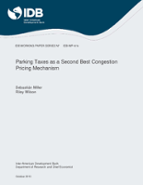Parking Taxes as a Second Best Congestion Pricing Mechanism
Date
Oct 2015
Growing vehicle use and congestion externalities have led many to consider alternative congestion pricing mechanisms, as road pricing often has high infrastructural costs and faces public opposition. This paper explores the role of parking taxation in reducing congestion by considering a natural experiment created by the progressive January 1, 2012 Chicago parking tax increase. Exploiting differences in vehicle use across income groups, it is estimated that the approximately $2 a day parking tax increase led to a 4-6 percent reduction in total vehicle trips in high-income areas, with the largest response seen on roads more heavily used by commuters. Also found are corresponding increases in use of public transit and a 3. 1 percent aggregate reduction in vehicle trips. It is concluded that parking taxes can help mitigate congestion externalities, although they are no more than about half as effective as more efficient congestion tolls.




